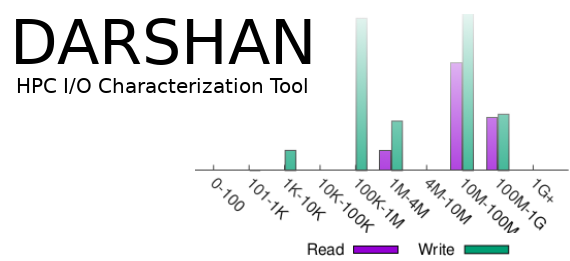We are pleased to announce a pre-release version of Darshan 3.4.0 (3.4.0-pre1) is now available HERE. As always, please be aware that Darshan pre-releases are experimental and not recommended for full-time use in production yet. An official 3.4.0 release will be made available soon.
This release contains a number of exciting new features and enhancements to Darshan:
- Added new heatmap module to record per-process histograms of I/O activity over time for POSIX, MPI-IO, and STDIO modules
- Added comprehensive darshan-runtime library configuration support, via environment variables and/or configuration file
- Allows user to control how much memory Darshan modules use at runtime, restricts instrumentation to specific file name patterns, etc.
- See the following link for more details: https://www.mcs.anl.gov/research/projects/darshan/docs/darshan-runtime.html#_configuring_darshan_library_at_runtime
- Implemented performance optimizations to Darshan’s wrappers, locking mechanisms, and timing mechanisms
- Includes optional RDTSCP-based timers via ‘–enable-rdtscp’ configure option
- Removed deprecated performance estimates from darshan-parser and added 2 new derived metrics when using ‘–perf’ :
- agg_time_by_slowest (total elapsed time performing I/O by the slowest rank)
- slowest_rank_rw_only_time (total elapsed time performing read/write operations by the slowest rank)
- Adopted automake/libtool support for Darshan build (contributed by Wei-Keng Liao)
- Increased default record name memory to 1 MiB per-process to avoid recent user reports of exceeding old limit (256 KiB)
This release also marks our first stable release of the PyDarshan log analysis module, including a new PyDarshan-based job summary tool (ultimately will replace darshan-job-summary script). Users can get PyDarshan directly from PyPI, e.g., using ‘pip install darshan’. Documentation can be found here: https://www.mcs.anl.gov/research/projects/darshan/documentation/
Please report any questions, issues, or concerns with this pre-relase using the darshan-users mailing list, or by opening an issue on our GitHub: https://github.com/darshan-hpc/darshan.
